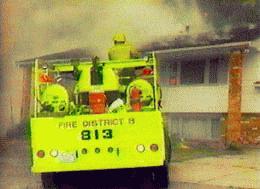On Wednesday, October 16, 1991, wildland fires kill two people and destroy 114 homes. The fires will burn for six days before they are contained. The 92 fires will be called the Spokane Firestorm and the tragedy will result in the state legislature passing a law to speed the mobilization of firefighting resources and to reimburse agencies who become overextended in fire disasters. That same weekend, a grassfire in Oakland, California, spreads and eventually destroys 2,900 structures and kills 25 persons.
On the morning of October 16, 1991, gale force winds gusting to 62 m.p.h. uprooted trees which downed power lines in the Spokane area. The energized wires ignited dry grass and brush. The first alarm was received at 8:45 a.m. near Spokane International Airport and within three hours, every firefighting resource in Spokane County was committed to battle blazes. Firefighters had to make decisions on which structures to save and which to leave to the flames. Some residents were evacuated ahead of flames and many more rushed to remove dry brush and leaves from around homes built near wild lands. To encourage removal of dry brush and leaves, County disposal sites waived dumping fees.
By noon on Saturday, October 19, Spokane and its population of approximately 350,000 were surrounded on three sides by fires. The Spokane County Commissioners and the Spokane City Council declared a state of emergency. By Sunday, many fires were contained.
On Monday, October 21, a second wind storm struck the area with gusts to 52 m.p.h. and the contained fires flared up. By 4:00 p.m., more than 4,000 firefighters called in from around Washington and Idaho managed to control the fires again. After six days, fire units began to demobilize. A post-fire investigation found that utility wires caused most of the blazes, but that the utility companies were negligent in only eight cases.
In the Nine Mile Falls area northwest of Spokane, 39-year-old Katherine Conyers was killed while fleeing the fire that was sweeping through the area. Joseph Upchurch, 26, a construction-company employee who was battling the blaze in Kootenai County, Idaho, was killed when a front-end loader overturned and crushed him.
This disaster and the Oakland Hills Fire demonstrated the hazards of urban encroachment on wildlands. The following year, the Washington State Legislature passed a law expanding the mobilization of resources during large fires, including the National Guard. The law also provided for the reimbursement of agencies called in to assist in large fires and for agencies whose own resources were exhausted.

